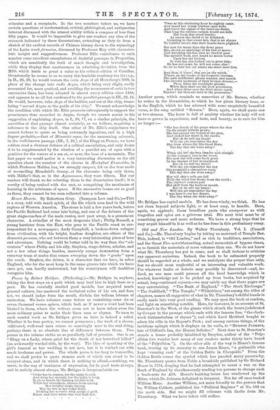Poems by Robert Bridges. (Pickering.)—Mr. Bridges is, anyhow, taking the
first steps on a path which may lead him to high fame as a poet. He has carefully studied good models, has acquired much general culture, has mastered the technical rules of his art, and does not, we should judge from the result, disdain the tedious labours of correction. We have volumes come before us containing some six or seven thousand verses apiece, which look as if never a word had been blotted in them, where the writers seem not to have taken even the most ordinary pains to make their lines scan or rhyme. To turn to such careful work as Mr. Bridges gives us here is indeed a relief. Whether it be true poetry, we cannot pronounce ; the work of a clever, 3ultivated, well-read man comes so amazingly near to the real thing, perhaps there is no absolute line of difference between them. Two poems in the volume strike us as peculiarly full of promise. One is an "Elegy on a Lady, whom grief for 'tho death of her betrothed killed" (an awkwardly worded title, by the way). The idea of speaking of the girl's funeral as her wedding is not new, but it is worked out with much freshness and power. The whole poem is too long to transcribe, and we shall prefer to quote stanzas each of which can stand to be enjoyed alone, and in which there is nothing to offend,—nothing, we mean, in the way of weakness of expression, for in good taste always, and in melody almost always, Mr. Bridges is irreproachable :— " Cloke her in ermine, for the night is cold, And wrap her warmly, for the night is long, In pious hands the flaming torches hold, While her attendants, chosen from among
Her faithful virgin throng, May lay her in her cedar litter, Decking her coverlet with sprigs of gold, Roses, and Mies white that best bat her.
'Twas at this sheltering hour he nightly came, And found her trusty window open wide, And knew the signal of the timorous flame, That long the restless curtain would not hide
Her form that stood beside;
As scarce she dared to be delighted,
Listening to that sweet tale, that is no shame To faithful lovers, that their hearts have plighted.
But now for many days the dewy grass Has shown no markings of his feet at morn : And watching she has seen no shadow pass The moonlit walk, and heard no music borne
Upon her ear forlorn.
In /11112 has she looked out to greet him; He has not come, he will not come, alas !
So let us bear her out where she must meet him.
. . . . ....... And thou, 0 lover ! that art on the watch, Where, on the banks of the forgetful streams, The pale indifferent ghosts wander, and snatch
The sweeter moments of their broken dreams,— Thou, when the torchlight gleams,
When thou shalt see the slow procession, And when thine ears the fitful music catch. Rejoice! for thou art near to thy possession."
Another poem, which reminds us somewhat of Mr. Barnes, whether he writes in the Dorsetshire, to which he has given literary fame, or in the English, which he has adorned with some exquisitely beautiful verse, is the song entitled "Return." Here, again, we shall quote one or two stanzas. The lover is full of anxiety whether his lady will not have so grown in experience, and taste, and beauty, as to care for him no longer :—
"She has drunk of the grape where the vine On the purple hillside grows: She has passed the bound of the pine, And slaked her thirst in the snows.
But oh be still my heart!
Will she yet remember the day
She drew where thy life-blood flows, The day that she went away ?
..... . . . . .
When she left she was slender and straight
As the youngest tree lathe wood, But now she will come back great In the charms of her womanhood. But oh be still my heart! Will she yet remember the day She promised a changeless state, The day that she went away?
Her tall ship's sails are full With the wind that blows from the south ; The stalwart rowers pull Her skiff from the harbour mouth.
But oh be still my heart I Will she yet remember the day
I was here to see her depart, The day when she went away ?"
Mr. sridges has copied models. He has done wisely, we think. He has not risen beyond subjects light, or at least easy, to handle. Here, again, we applaud; these beardless poets who overpower us with tragedies and epics are a grievous trial. His next trial must be of something graver and more arduous. We have a strong hope that he may acquit himself in it as well as he has done in this preliminary essay.


































 Previous page
Previous page